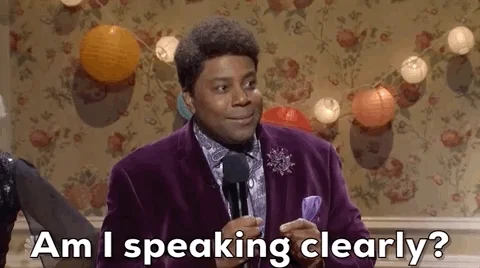Do you have a hard time getting your message across when speaking to an audience?

Use this 3-step method to avoid awkward public speaking mishaps!
⚙ Step #1: Get Ready
Consider the topic

➡ If you have a choice of topics to speak about, pick one that you're passionate about. Finding "what makes your heart sing" is the finest way to determine what you're passionate about.

➡ If you're assigned a topic to speak on for a specific occasion (e.g., a school captain election campaign), consider it carefully, read related literature, and then prepare a speech.
 Consider the context
Consider the context
Consider the following questions as you determine the speech's length, organization, and themes:
✔ What's the nature of the occasion?
✔ Who's the audience and how big is it?
✔ Who else will speak?
✔ Why is this topic important to my audience?
⚙ Step #2: Prepare Your Speech

Research the topic and outline your speech
➡ You can research your topic by:
✔ Visiting your school/college/community library.
✔ Using search engines and electronic periodicals.
➡ Note your big ideas on cards or slips of paper.
➡ Use a Google Doc to group your facts, illustrations, and anecdotes under the main ideas.
 Write and revise
Write and revise
➡ Write your speech in full once you've outlined it.
➡ Use clear, concise, and appealing language to communicate your ideas.
➡ Simplify it by checking its' logic and accuracy.

⚙ Step #3: Choose the Right Delivery Method

Pick a way to deliver the speech that works most effectively for the occasion.

Read from a script
Use this method only when you absolutely must get the words right, or you're a bit nervous (e.g. announcements/funeral speech).

Memorize your speech
If you have a TED Talk-style speech with lots of time to prepare, you can do away with notes, keep eye contact with the audience, and move around the stage.

Speak impromptu
If you have to speak quickly on a specific subject that you're really comfortable talking about, you can do it without much preparation (e.g. your daily routine).

Extemporaneous speaking
If you're allowed to carry notes but don't want to sound too rehearsed, this method will help you connect with your audience in a conversational way.
⚡ Quiz
Meet Dip

He's a university student who will be awarded a departmental prize. He'll be expected to give a short speech after he receives the award. However, he's quite shy and doesn't have much experience with public speaking.
Quiz
Which delivery method would work best for him?
💁♀️ Final Tips To Ace Your Speech
 Photo by Priscilla Du Preez on Unsplash
Photo by Priscilla Du Preez on UnsplashChoose your words wisely. Use concise and specific language ("brave" is more direct than "impudent," "racism" is more appropriate than "social-political concerns").
Be lively. Keep a steady gaze (or look up often if using notes), move around the stage, and play out your ideas with your face or your entire body.
Rehearse. Practice your gestures and movements along with your speech.
Be calm. Practice breathing exercises if you're stressed before the speech.
Keep the right tone and pace. Speak in an appropriate tone (conversational or formal depending on the context) tone, at about 120 to 150 words per minute.
Stay away from "powerless" words while expressing your ideas. Avoid phrases like "it seems to me" or "in my humble opinion". You'll sound less confident.
Don't stand stiffly. Try to move around or gesture.
Don't be self-conscious. Focus on your content over your appearance during the speech.
Take Action
Are you ready to use the 3-step method to speak more clearly?

Your feedback matters to us.
This Byte helped me better understand the topic.


